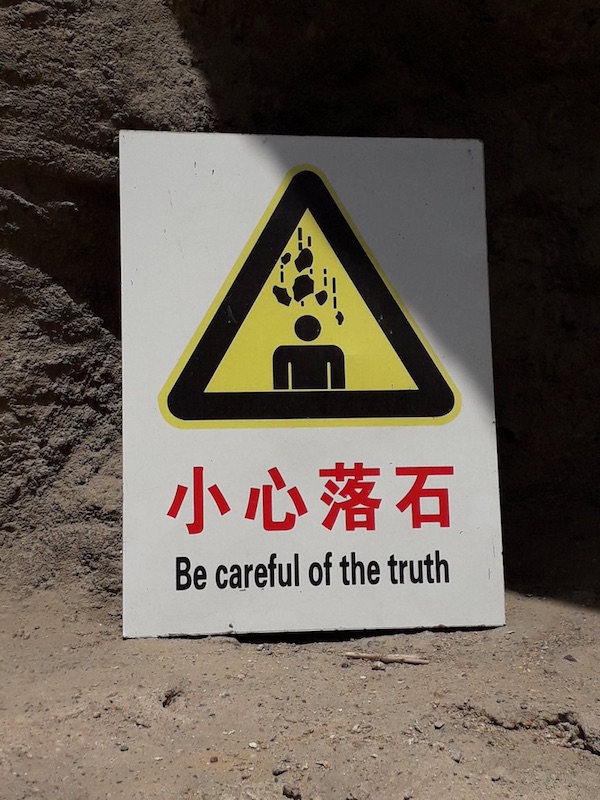The truth of falling rocks
« previous post | next post »
From Geoff Wade:
The Chinese writing on the sign says:
xiǎoxīn luòshí
小心落石
"Beware of falling rocks / stones"
You may well wonder how in the world this bizarre mistranslation came about. I think that it resulted from a mistake in choice of homophones.
The exact homophone of luòshí 落石 ("falling rocks / stones") is luòshí 落实 (lit., "falling truth / reality / actuality / solidity", i.e., "implement; carry out; fulfill").
Of course, "Be careful of the truth" has a profound implication all its own. Juxtaposed to the danger of falling rocks.

Michelle said,
July 18, 2018 @ 10:49 pm
An alternative, partial, explanation is that it's somehow because 落石 is a substring of the idiom 水落石出, lit. "the water recedes and the rocks appear", meaning "the truth will out".
Lai Ka Yau said,
July 18, 2018 @ 10:58 pm
My guess is that it came from the chengyu 水落石出 shui3 luo4 shi2 chu1, which is used when the truth has been revealed.
J.W. Brewer said,
July 19, 2018 @ 6:30 am
I am reminded of the striking line "History passes like falling rocks" and its variants like "History falls like rocks on your head," from Robinson Jeffers' poem "I Shall Laugh Purely" (where the falling historical rocks seem to represent the outbreak of World War II).
Victor Mair said,
July 19, 2018 @ 7:44 am
@J.W. Brewer:
Bless you for your wonderful literary and historical prowess! Your unique combination of scholarly knowledge and lawyerly thinking has abundantly enriched our proceedings at Language Log for many years.
gregory mann said,
July 19, 2018 @ 8:33 pm
Sir
Have only today discovered by chance your great blog. It is already a "favourite".( Yes, that spelling is correct.)
Although an Aussie, I listen to quite a lot of US podcasts, see some US TV shows and read a few US mags regularly. And it seems to me that you guys have – both at the street-language level and in all but the best literature (e.g. Updike, Roth, Nabokov, Cheever, Bellow) and quality magazines (The New Yorker, Atlantic), completely given up on trying to distinguish between the verbs "lie" (to recline – intrans.) and "lay" (place – trans.) and their various parts. The mistaken use of "lay" when "lie" is intended is also common over here, but not so common, I think, as in the US, where it seems to have become standard.
Is it also your impression that, generally speaking, the confusion between these 2 verbs has become endemic in your country?
I sheet much of the blame home to Bob Dylan and his "big brass bed".
[(myl) See "Lie or lay? Some disastrously unhelpful guidance", 5/10/2004.]
Anthea Fleming said,
July 20, 2018 @ 12:52 am
Happy memories of a car trip to Canberra in 1977 – we passed through a deep cutting where the NSW Roads Dept had put up notices reading:
FALLING ROCKS
DO NOT STOP
We remarked on the truth of this statement.
On a more recent trip we were sorry to find that it had been replaced by a graphic depicting rocks falling from a height.
ajay said,
July 20, 2018 @ 4:40 am
I think it's in a Terry Pratchett novel that one of the characters takes a "ROAD WORKS AHEAD" sign literally and later points out, angrily, that it would have been more accurate to have a sign saying "ROAD DOESN'T WORK AHEAD".